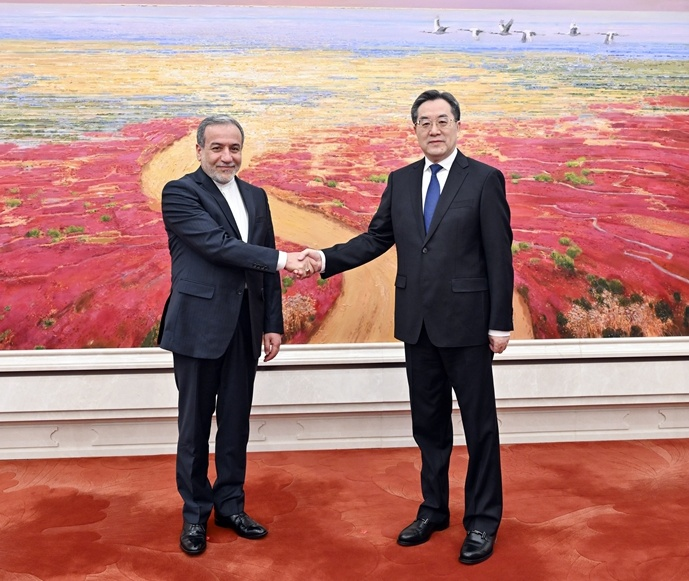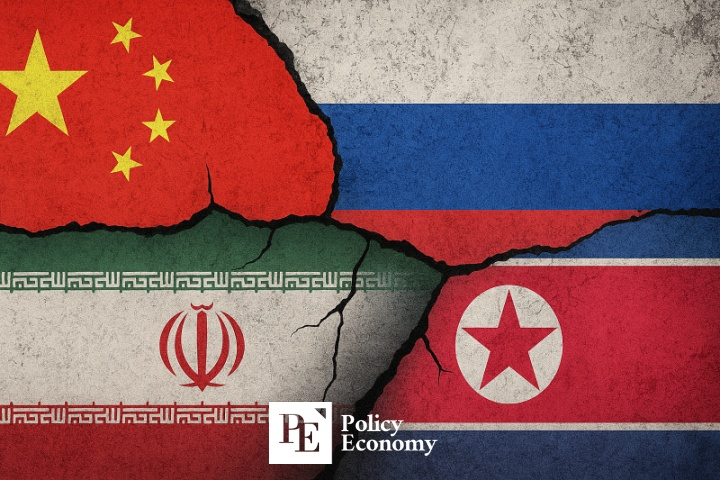Two Perspectives on Iran: ‘The U.S. Strikes, China Hides’ — Exposing the Illusion of the Anti-U.S. Bloc
Input
Modified
Iran’s “Friends” Diplomacy Strategy Loses Impact Self-Preservation and Cracks Emerging in the Anti-U.S. Alliance China’s Calculated Silence Aimed at the Taiwan Strait?

Photo: The State Council of China
Following the U.S. strike on Iran’s nuclear facilities, China’s consistent silence has raised questions within the international community about the true nature of the so-called "anti-U.S. alliance." Even as a key ally faced a direct threat, China refrained from taking any meaningful action, prompting assessments that its influence in the Middle East will rapidly diminish. In contrast, the United States appears to be strengthening its military and diplomatic presence in the region, gaining a clear strategic advantage. While some suggest that China’s silence is a calculated decision, it is expected to inevitably deal a diplomatic blow to Beijing by shaking the trust of allies like Iran.
Only Generic Messages Amid an Ally’s Crisis
According to Reuters and other foreign media on the 24th (local time), Iranian President Masoud Pezeshkian delivered a national address the previous day, saying, “The 12-day war (with Israel) has come to an end,” and declared, “This decision to end the war was made on our own terms.” On the same day, Israeli Prime Minister Benjamin Netanyahu also effectively acknowledged a ceasefire during a cabinet meeting attended by the country’s defense minister, the chief of staff of the Israel Defense Forces, and the head of Mossad, stating that “all operational goals, including halting Iran’s nuclear development, have been achieved.”
The armed conflict between Iran and Israel began on the 12th when Israel launched airstrikes on Iran’s nuclear facilities and military bases. Citing the need to preempt Iran’s nuclear weapons development and military threats, Israel struck key sites in Natanz, Isfahan, and Tehran. The attacks killed several top Iranian figures, including the chief of staff of Iran’s armed forces, the commander of the Revolutionary Guard, and nuclear scientists. Iran responded immediately with retaliatory attacks, leading to intense fighting between the two countries.
Amid this escalation, the U.S. deployed B-2 stealth bombers to conduct precision strikes on three Iranian nuclear facilities (Natanz, Isfahan, and Fordow). Two days later, Iran fired 14 ballistic missiles at a U.S. military base in Qatar. However, as the attack had been pre-announced, the damage was minimal. President Donald Trump commented, “Iran acted just as we expected,” adding, “Now we can move towards peace.” The ceasefire news between Iran and Israel was also announced a day earlier via President Trump’s social media.
Immediately after the U.S. carried out its precision strikes on Iran’s nuclear facilities, the international community’s attention turned to China’s reaction, given its alliance with Iran. The situation at the time was so tense that some were speculating about extreme scenarios, like the closure of the Strait of Hormuz. Tensions across the Middle East were at their peak. Yet China neither issued a clear statement nor took any visible action. Even though Iran, a key strategic partner and ally, had come under direct military attack, China merely issued a generalized statement saying that “maintaining the security and stability of the Strait of Hormuz aligns with the international community’s common interests.” This stands in stark contrast to the U.S., which showcased its presence by leading with military deterrence and maintaining real control over regional order.
This also highlights a sharp deviation from China’s traditional strategy of balanced diplomacy in the Middle East. In recent years, China has cultivated parallel economic and diplomatic ties with both Saudi Arabia and Iran, positioning itself as a mediator. It has also worked intensively to strengthen a non-Western bloc through the BRICS framework. Especially with Iran, China has flaunted a "brotherly" level relationship, marked by oil imports and military cooperation. However, in this latest crisis, China failed to deliver any meaningful response, drawing criticism for turning its back on Iran’s isolation.
As a result, with the stark contrast between the U.S. and China’s approaches, analysts believe that the diplomatic landscape in the Middle East has reached a turning point. The U.S. has secured the upper hand not just militarily but also in setting the diplomatic agenda, reaffirming solidarity with its partner nations in the region through the Iran strikes. On the other hand, China’s retreat into the background has damaged its self-styled image as a "Middle East mediator." This situation is seen as a symbolic moment underscoring that China can no longer claim to offer an "alternative leadership" role in the Middle East.

Despite Shared Rhetoric, Military and Diplomatic Unity is Absent
This calculated silence is not unique to China. The responses from countries that had formed an anti-U.S. front following the strike on Iran’s nuclear facilities were uniformly lukewarm. The coalition, often referred to as a China-Russia-North Korea-Iran axis, failed to deliver any clear or unified message in the face of the crisis. China and Russia limited their reactions to formal expressions of regret, while North Korea offered only symbolic support through diplomatic channels without taking any meaningful action. Despite their anti-U.S. rhetoric, each country ultimately prioritized its own safety when faced with the risk of actual war, exposing the reality of fragmented self-preservation.
Cracks within the anti-U.S. coalition have appeared repeatedly. Russia’s invasion of Ukraine is a prime example. China only went as far as opposing Western sanctions against Russia, and Iran, too, merely voiced concern over NATO expansion without offering any tangible military support or action. All these countries have long used anti-U.S. sentiment as diplomatic leverage, but the latest developments clearly reveal the absence of real military or diplomatic solidarity.
Ultimately, this incident is likely to expose the true nature of the anti-U.S. bloc, nothing more than loose coordination based on strategic self-interest. While China and Russia refrained from taking decisive action, Iran likely faced extreme helplessness and isolation. Meanwhile, the United States reaffirmed its level of cooperation with traditional allies and strengthened its diplomatic standing. This shift suggests that the U.S.'s strategic diplomatic framework, spanning the Middle East and Northeast Asia, will continue to marginalize anti-U.S. countries even further.
Was the U.S. Military Distraction China’s Real Target?
Amid these developments, some analysts argue that China’s inaction was a “calculated silence.” From China’s perspective, it is far more beneficial to consolidate influence in nearby waters like the Taiwan Strait and the South China Sea while the U.S. focuses on military deployment in the Middle East. In fact, shortly after the Iran crisis, China’s navy expanded its scheduled training exercises near Taiwan and conducted several unmanned reconnaissance drone operations, demonstrating its military presence.
Another reason for this calculated silence may be China’s desire to expose the structural weakness of the U.S. through the strategic dispersal of American forces. As the U.S. redeploys troops to the Middle East, its capacity to defend East Asia becomes relatively strained. This creates a structural vulnerability that allows China to recalibrate its position in the Taiwan Strait. The Iran crisis, by diverting U.S. resources to the Middle East, could lead to a temporary easing of military pressure around Taiwan, giving China greater strategic flexibility.
However, the problem is that this strategic silence has eroded trust in China’s Middle East strategy. As mentioned earlier, China had been carefully expanding its influence in the Middle East by mediating between Iran and Saudi Arabia. However, when an actual crisis arose, China failed to take any meaningful action. This may not only alienate Iran but also other Middle Eastern countries that had placed their hopes in China’s leadership. As a result, while China’s dual strategy may have yielded some tactical benefits in areas close to home, such as Taiwan, it has clearly caused significant diplomatic losses in the Middle East.





















